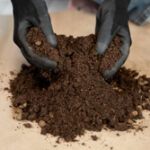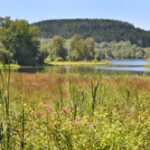
Stichting Turfvrij protects peat bogs. We're fighting for a ban on peat. This way, we can contribute to tackling the climate crisis.
Peat bogs are the rainforests of Europe because of their essential role in CO2 storage, water regulation, and unique biodiversity. The destruction of these areas contributes 5 percent of global greenhouse gas emissions, more than all the emissions of the aviation industry.
This destruction is partly caused by peat extraction for use in potting soil. Private individuals use this potting soil for their houseplants, filling plant pots, sowing, and cuttings. The horticultural sector also grows plants in peat.
If we stop using peat for growing plants, we can contribute significantly to combating the climate crisis. In fact, if we do nothing to protect peatlands, we will be unable to stop global warming.
Our aim
Stichting Turfvrij's goal is to ban the use of peat in the Netherlands. This would be a huge milestone in the pursuit of comprehensive global protection of all peat bogs.

Peat-free potting ground

Peat-free plants

